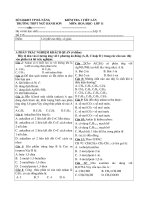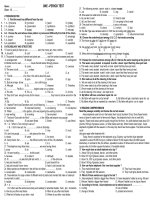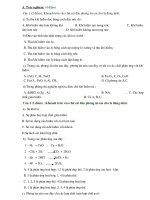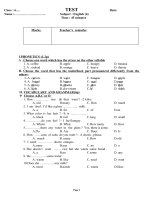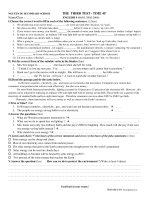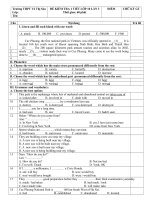ĐỀ KIỂM TRA 1 TIẾT LẦN 3 KHỐI 12 Mã đề: 135 potx
Bạn đang xem bản rút gọn của tài liệu. Xem và tải ngay bản đầy đủ của tài liệu tại đây (101.92 KB, 9 trang )
ĐỀ KIỂM TRA 1 TIẾT LẦN 3 – KHỐI 12 Mã đề: 135
Choose the best answer A, B, C or D to complete the sentences.
Câu 1: She sent me a(n) ______ letter thanking me for my invitation.
A. polite B. impolite C. politeness D. impoliteness
Câu 2: ______ Hoai Linh’s last comedy? – Yes, I saw it last week.
A. Have you seen B. Did you see C. Had you seen D. Will you see
Câu 3: Those two countries have always ______ close relations.
A. maintain B. maintained C. maintaining D. maintenance
Câu 4: She asked me ______ my holidays ______.
A. where I spent / last year B. where I spent / the previous year
C. where I had spent / the previous year D. where did I spend / last year
Câu 5: Marriage should be an equal ______.
A. belief B. partnership C. attractiveness D. confiding
Câu 6: No matter what happens next, I ______ always support you.
A. am B. have C. will D. would
Câu 7: We can raise our hand slightly to show that we need assistance.
A. help B. attention C. communication D. food
Câu 8: Can you pass me the magazine?
A. Would you like passing me the magazine? B. Would you mind passing me the magazine?
C. Do you like to pass the magazine me? D. Let’s pass me the magazine
Câu 9: Choose the word whose underlined part is pronounced differently from the rest of the group.
A. helped B. laughed C. married D. worked
Câu 10: Choose the word whose stress pattern is different from the others of the group.
A. counterpart B. instance C. attract D. signal
Câu 11: Last night while we watched an exciting game on television in our living room, the electricity went out.
A B C D
Câu 12: He said that he couldn't remember where he left his car two days before.
A B C D
Câu 13: Choose the word whose underlined part is pronounced differently from the rest of the group.
A. looked B. booked C. naked D. cooked
Câu 14: This is the most interesting book ______.
A. I’ve ever read B. I never read C. I ever read D. I had ever read
Câu 15: ______ I was working in the garden, John was repairing the washing machine.
A. while B. before C. as soon as D. until
Câu 16: Do you think that “______” marriage is much better than “contractual” marriage”?
A. romanticize B. romance C. romanticism D. romantic
Câu 17: Maria: "Thanks for the lovely evening." – Diana: "______."
A. Oh, that's right B. No, it's not good C. Yes, it's really great D. I'm glad you enjoyed it
Câu 18: My sister ______ her college degree in 1986.
A. finished B. was finishing C. has finished D. finishes
Câu 19: Dad’s busy at the moment. He ______ the sitting-room.
A. has redecorated B. is decorating C. will redecorate D. redecorates
Câu 20: ___ get tired of answering the same questions everyday?
A. Have you ever B. Are you ever C. Do you ever D. Had you ever
Câu 21: Non-verbal ______ such as waving, nodding or shaking of the head also have cultural meanings.
A. signals B. situations C. instances D. languages
Câu 22: Choose the word whose stress pattern is different from the others of the group.
A. situation B. appropriate C. entertainment D. informality
Câu 23: The teacher told Joe stopped interrupting his explaining the new lecture.
A B C D
Câu 24: My boss was very kind. He was very ______ when I was ill.
A. impolite B. supportive C. obvious D. confident
Câu 25: "Do you watch television every evening, Van?", said Long.
A. Long asked Van if she’d watched TV every evening.
B. Long asked Van did she watch TV every evening.
ĐỀ KIỂM TRA 1 TIẾT LẦN 3 – KHỐI 12 Mã đề: 135
C. Long asks Van if does she watch TV every evening.
D. Long asked Van if she watched TV every evening.
Câu 26: Choose the word whose underlined part is pronounced differently from the rest of the group.
A. banquets B. photographs C. tricks D. choices
Câu 27: “Don’t talk in class”, the teacher said.
A. The teacher told his student do not talk in class.B. The teacher told his student did not talk in class.
C. The teacher told his student not to talk in class.D. The teacher told his student not talking in class.
Câu 28: Maria: “How well you are playing tennis!” – Diana: “______”
A. Say it again. I like to hear your words. B. I think so. I’m proud of myself.
C. Thank you too much. D. Many thanks. That is a nice compliments.
Câu 29: When I looked out of the door, I found out that my motorcycle ______.
A. had disappeared B. disappeared C. was disappeared D. had been disappeared
Câu 30: “He left school three years ago.” Means ______.
A. It is three years since he had left school. B. It is three years since he has left school.
C. It is three years since he left school. D. It has been three years ago since he left school.
Choose the correct option (A, B, C or D) to fill in each of the blanks from question 31 to 35.
OTHER CULTURES
What is culture? Culture (31)____ the way of living of a particular group of people. People from different cultures grow up
with different customs, beliefs and values. For example, if you travel from one country (32)____ another, you probably find
the people do something very (33)____ to the ways you are familiar with in your culture. Culture is usually run from parents to
children for many (34)____, so people sometimes believe that their culture is the only correct way to live.
Do you think everyone in the world should do things as you do them in your culture or (35)____ you open-minded about
other customs? Many people believe that learning about other cultures can be educational and rewarding.
Câu 31: A. mean B. to mean C. means D. meaning
Câu 32: A. to B. for C. off D. about
Câu 33: A. indifferent B. different C. difference D. differently
Câu 34: A. partners B. generations C. families D. couples
Câu 35: A. do B. are C. have D. will
Read the text carefully, choose the optiopns that best complete or answer the questions from 36 to 40.
Family types vary in different countries and among different cultures. In Western, industrialized societies, the nuclear
family is the most common family type. It consists of a father, a mother, and their children. But nuclear families exists
alongside many other types of family units. In the single-parents family, for example, a mother or a father heads the family
alone. A blended family is formed when a divorced or widowed parent remarries. As divorce rates have risen, the number of
single-parent and blended families has increased.
In many parts of the world, parents and children live together with other family members under the same roof. These
complex families usually contain several generations of family members, including grandparents, parents and children. They
may also include brothers or sisters and their families, uncles, aunts and cousins. Even when relatives do not live together, they
still consider themselves members of the same extended family. In Latin American and Hispanic American cultures, the
extended family includes grandparents, uncles, aunts and cousins.
Câu 36: The nuclear family is the most common family type ______.
A. that leads to the divorce of parents B. that consists of more than two generations
C. in many industrialized countries D. in countries with nuclear weapons
Câu 37: In the single-parent family, ______.
A. the number of blended children has increased B. there are often no children
C. children live alone D. only one parent live with his or her child or children
Câu 38: The word which has similar meaning to the word “blended” is ______.
A. formed B. complex C. married D. mixed
Câu 39: Grandparents, parents and children are mentioned as ______.
A. three branches of a tree family B. the closest and happiest relatives
C. a complex combination D. the three typical generations of an extended family
Câu 40: The second paragraph is about ______.
A. American cultures. B. the relationship between family members.
C. the extended family. D. relatives and family members.
ĐỀ KIỂM TRA 1 TIẾT LẦN 3 – KHỐI 12 Mã đề: 135
Choose the best answer A, B, C or D to complete the sentences.
Câu 1: ___ Hoai Linh’s last comedy? – Yes, I saw it last week.
A. Have you seen B. Will you see C. Did you see D. Had you seen
Câu 2: My sister ____ her college degree in 1986.
A. finished B. was finishing C. has finished D. finishes
Câu 3: We can raise our hand slightly to show that we need assistance.
A. food B. communication C. attention D. help
Câu 4: Marriage should be an equal ______.
A. confiding B. belief C. partnership D. attractiveness
Câu 5: ______ I was working in the garden, John was repairing the washing machine.
A. before B. while C. as soon as D. until
Câu 6: She asked me ______ my holidays ______.
A. where did I spend / last year B. where I had spent / the previous year
C. where I spent / the previous year D. where I spent / last year
Câu 7: Maria: "Thanks for the lovely evening." – Diana: "______."
A. Oh, that's right B. No, it's not good C. Yes, it's really great D. I'm glad you enjoyed it
Câu 8: Those two countries have always ______ close relations.
A. maintained B. maintain C. maintaining D. maintenance
Câu 9: The teacher told Joe stopped interrupting his explaining the new lecture.
A B C D
Câu 10: She sent me a(n) ______ letter thanking me for my invitation.
A. impoliteness B. politeness C. polite D. impolite
Câu 11: “He left school three years ago.” Means ______.
A. It is three years since he had left school. B. It is three years since he has left school.
C. It is three years since he left school. D. It has been three years ago since he left school.
Câu 12: Choose the word whose underlined part is pronounced differently from the rest of the group.
A. looked B. booked C. naked D. cooked
Câu 13: Do you think that “______” marriage is much better than “contractual” marriage”?
A. romantic B. romance C. romanticism D. romanticize
Câu 14: He said that he couldn't remember where he left his car two days before.
A B C D
Câu 15: Choose the word whose stress pattern is different from the others of the group.
A. counterpart B. signal C. attract D. instance
Câu 16: Choose the word whose underlined part is pronounced differently from the rest of the group.
A. helped B. laughed C. worked D. married
Câu 17: ___ get tired of answering the same questions everyday?
A. Have you ever B. Do you ever C. Had you ever D. Are you ever
Câu 18: Dad’s busy at the moment. He ___ the sitting-room.
A. has redecorated B. is decorating C. will redecorate D. redecorates
Câu 19: No matter what happens next, I ___ always support you.
A. am B. will C. would D. have
Câu 20: Choose the word whose stress pattern is different from the others of the group.
A. situation B. appropriate C. entertainment D. informality
Câu 21: “Don’t talk in class”, the teacher said.
A. The teacher told his student not to talk in class.B. The teacher told his student did not talk in class.
C. The teacher told his student not talking in class.D. The teacher told his student do not talk in class.
Câu 22: Non-verbal ______ such as waving, nodding or shaking of the head also have cultural meanings.
A. languages B. situations C. signals D. instances
ĐỀ KIỂM TRA 1 TIẾT LẦN 3 – KHỐI 12 Mã đề: 135
Câu 23: My boss was very kind. He was very ______ when I was ill.
A. impolite B. supportive C. obvious D. confident
Câu 24: "Do you watch television every evening, Van?", said Long.
A. Long asked Van if she’d watched TV every evening.
B. Long asked Van did she watch TV every evening.
C. Long asks Van if does she watch TV every evening.
D. Long asked Van if she watched TV every evening.
Câu 25: Can you pass me the magazine?
A. Would you mind passing me the magazine? B. Let’s pass me the magazine
C. Would you like passing me the magazine? D. Do you like to pass the magazine me?
Câu 26: Choose the word whose underlined part is pronounced differently from the rest of the group.
A. tricks B. choices C. banquets D. photographs
Câu 27: Maria: “How well you are playing tennis!” – Diana: “______”
A. Say it again. I like to hear your words. B. I think so. I’m proud of myself.
C. Thank you too much. D. Many thanks. That is a nice compliments.
Câu 28: When I looked out of the door, I found out that my motorcycle ______.
A. had disappeared B. disappeared C. was disappeared D. had been disappeared
Câu 29: Last night while we watched an exciting game on television in our living room, the electricity
went out.
A B C D
Câu 30: This is the most interesting book _____ .
A. I’ve ever read B. I ever read C. I never read D. I had ever read
Choose the correct option (A, B, C or D) to fill in each of the blanks from question 31 to 35.
OTHER CULTURES
What is culture? Culture (31)____ the way of living of a particular group of people. People from
different cultures grow up with different customs, beliefs and values. For example, if you travel from one
country (32)___ another, you probably find the people do something very (33)___ to the ways you are
familiar with in your culture. Culture is usually run from parents to children for many (34)___, so people
sometimes believe that their culture is the only correct way to live.
Do you think everyone in the world should do things as you do them in your culture or (35)___ you
open-minded about other customs? Many people believe that learning about other cultures can be
educational and rewarding.
Câu 31: A. to mean B. meaning C. means D. mean
Câu 32: A. to B. about C. off D. for
Câu 33: A. difference B. indifferent C. different D. differently
Câu 34: A. generations B. partners C. couples D. families
Câu 35: A. do B. will C. are D. have
Read the text carefully, choose the optiopns that best complete or answer the questions from 36 to 40.
Family types vary in different countries and among different cultures. In Western, industrialized
societies, the nuclear family is the most common family type. It consists of a father, a mother, and their
children. But nuclear families exists alongside many other types of family units. In the single-parents
family, for example, a mother or a father heads the family alone. A blended family is formed when a
divorced or widowed parent remarries. As divorce rates have risen, the number of single-parent and
blended families has increased.
In many parts of the world, parents and children live together with other family members under the
same roof. These complex families usually contain several generations of family members, including
grandparents, parents and children. They may also include brothers or sisters and their families, uncles,
aunts and cousins. Even when relatives do not live together, they still consider themselves members of
the same extended family. In Latin American and Hispanic American cultures, the extended family
includes grandparents, uncles, aunts and cousins.
Câu 36: The nuclear family is the most common family type ______
A. in many industrialized countries B. that leads to the divorce of parents
C. in countries with nuclear weapons D. that consists of more than two generations
Câu 37: In the single-parent family, ______
A. children live alone B. there are often no children
ĐỀ KIỂM TRA 1 TIẾT LẦN 3 – KHỐI 12 Mã đề: 135
C. the number of blended children has increased D. only one parent live with his or her child or
children
Câu 38: The word which has similar meaning to the word “blended” is ______
A. complex B. married C. mixed D. formed
Câu 39: Grandparents, parents and children are mentioned as ______
A. a complex combination B. the closest and happiest
relatives
D. three branches of a tree family C. the three typical generations of an extended family
Câu 40: The second paragraph is about ______
A. American cultures. B. the relationship between family members.
C. relatives and family members. D. the extended family.
Choose the best answer A, B, C or D to complete the sentences.
Câu 1: The teacher told Joe stopped interrupting his explaining the new lecture.
A B C D
Câu 2: My sister ____ her college degree in 1986.
A. has finished B. was finishing C. finished D. finishes
Câu 3: "Do you watch television every evening, Van?", said Long.
A. Long asked Van if she’d watched TV every evening.
B. Long asked Van did she watch TV every evening.
C. Long asks Van if does she watch TV every evening.
D. Long asked Van if she watched TV every evening.
Câu 4: He said that he couldn't remember where he left his car two days before.
A B C D
Câu 5: Maria: "Thanks for the lovely evening." – Diana: "______."
A. No, it's not good B. Yes, it's really great C. I'm glad you enjoyed it D. Oh, that's right
Câu 6: Maria: “How well you are playing tennis!” – Diana: “______”
A. I think so. I’m proud of myself. B. Thank you too much.
C. Many thanks. That is a nice compliments. D. Say it again. I like to hear your words.
Câu 7: Those two countries have always ______ close relations.
A. maintained B. maintain C. maintaining D. maintenance
Câu 8: She asked me ______ my holidays ______.
A. where I spent / the previous year B. where did I spend / last year
C. where I spent / last year D. where I had spent / the previous year
Câu 9: Do you think that “______” marriage is much better than “contractual” marriage”?
A. romanticize B. romance C. romantic D. romanticism
Câu 10: ___ get tired of answering the same questions everyday?
A. Do you ever B. Have you ever C. Are you ever D. Had you ever
Câu 11: She sent me a(n) ______ letter thanking me for my invitation.
A. impoliteness B. impolite C. politeness D. polite
Câu 12: Choose the word whose stress pattern is different from the others of the group.
A. appropriate B. informality C. entertainment D. situation
Câu 13: This is the most interesting book _____ .
A. I’ve ever read B. I ever read C. I had ever read D. I never read
Câu 14: Choose the word whose stress pattern is different from the others of the group.
A. counterpart B. signal C. attract D. instance
Câu 15: Choose the word whose underlined part is pronounced differently from the rest of the group.
A. helped B. laughed C. worked D. married
Câu 16: “Don’t talk in class”, the teacher said.
A. The teacher told his student not to talk in class. B. The teacher told his
student not talking in class.
C. The teacher told his student do not talk in class. D. The teacher told his
student did not talk in class.
Câu 17: Can you pass me the magazine?
A. Would you like passing me the magazine? B. Would you mind passing me the magazine?
ĐỀ KIỂM TRA 1 TIẾT LẦN 3 – KHỐI 12 Mã đề: 135
C. Do you like to pass the magazine me? D. Let’s pass me the magazine
Câu 18: My boss was very kind. He was very ______ when I was ill.
A. impolite B. supportive C. obvious D. confident
Câu 19: Choose the word whose underlined part is pronounced differently from the rest of the group.
A. booked B. cooked C. looked D. naked
Câu 20: No matter what happens next, I ___ always support you.
A. will B. am C. have D. would
Câu 21: Non-verbal ______ such as waving, nodding or shaking of the head also have cultural meanings.
A. languages B. situations C. signals D. instances
Câu 22: ______ I was working in the garden, John was repairing the washing machine.
A. as soon as B. before C. while D. until
Câu 23: We can raise our hand slightly to show that we need assistance.
A. food B. attention C. communication D. help
Câu 24: “He left school three years ago.” Means ______.
A. It is three years since he had left school. B. It has been three years ago since he left school.
C. It is three years since he has left school. D. It is three years since he left school.
Câu 25: Marriage should be an equal ______.
A. partnership B. attractiveness C. confiding D. belief
Câu 26: ___ Hoai Linh’s last comedy? – Yes, I saw it last week.
A. Have you seen B. Had you seen C. Will you see D. Did you see
Câu 27: When I looked out of the door, I found out that my motorcycle ______.
A. had disappeared B. disappeared C. was disappeared D. had been disappeared
Câu 28: Last night while we watched an exciting game on television in our living room, the electricity
went out.
A B C D
Câu 29: Choose the word whose underlined part is pronounced differently from the rest of the group.
A. tricks B. choices C. banquets D. photographs
Câu 30: Dad’s busy at the moment. He ___ the sitting-room.
A. has redecorated B. is decorating C. will redecorate D. redecorates
Choose the correct option (A, B, C or D) to fill in each of the blanks from question 31 to 35.
OTHER CULTURES
What is culture? Culture (31)____ the way of living of a particular group of people. People from
different cultures grow up with different customs, beliefs and values. For example, if you travel from one
country (32)___ another, you probably find the people do something very (33)___ to the ways you are
familiar with in your culture. Culture is usually run from parents to children for many (34)___, so people
sometimes believe that their culture is the only correct way to live.
Do you think everyone in the world should do things as you do them in your culture or (35)___ you
open-minded about other customs? Many people believe that learning about other cultures can be
educational and rewarding.
Câu 31: A. means B. to mean C. mean D. meaning
Câu 32: A. to B. off C. about D. for
Câu 33: A. indifferent B. difference C. differently D. different
Câu 34: A. families B. couples C. partners D. generations
Câu 35: A. do B. will C. are D. have
Read the text carefully, choose the optiopns that best complete or answer the questions from 36 to 40.
Family types vary in different countries and among different cultures. In Western, industrialized
societies, the nuclear family is the most common family type. It consists of a father, a mother, and their
children. But nuclear families exists alongside many other types of family units. In the single-parents
family, for example, a mother or a father heads the family alone. A blended family is formed when a
divorced or widowed parent remarries. As divorce rates have risen, the number of single-parent and
blended families has increased.
In many parts of the world, parents and children live together with other family members under the
same roof. These complex families usually contain several generations of family members, including
grandparents, parents and children. They may also include brothers or sisters and their families, uncles,
aunts and cousins. Even when relatives do not live together, they still consider themselves members of
ĐỀ KIỂM TRA 1 TIẾT LẦN 3 – KHỐI 12 Mã đề: 135
the same extended family. In Latin American and Hispanic American cultures, the extended family
includes grandparents, uncles, aunts and cousins.
Câu 36: The nuclear family is the most common family type ______
A. that leads to the divorce of parents B. in many industrialized countries
C. in countries with nuclear weapons D. that consists of more than two generations
Câu 37: In the single-parent family, ______
A. there are often no children B. the number of blended children has increased
C. children live alone D. only one parent live with his or her child or
children
Câu 38: The word which has similar meaning to the word “blended” is ______
A. married B. mixed C. complex D. formed
Câu 39: Grandparents, parents and children are mentioned as ______
A. the closest and happiest relatives B. the three typical generations of an extended family
C. a complex combination D. three branches of a tree family
Câu 40: The second paragraph is about ______
A. the relationship between family members. B. the extended family.
C. relatives and family members. D. American cultures.
Choose the best answer A, B, C or D to complete the sentences.
Câu 1: No matter what happens next, I ___ always support you.
A. will B. am C. have D. would
Câu 2: "Do you watch television every evening, Van?", said Long.
A. Long asked Van if she’d watched TV every evening.
B. Long asked Van did she watch TV every evening.
C. Long asks Van if does she watch TV every evening.
D. Long asked Van if she watched TV every evening.
Câu 3: Can you pass me the magazine?
A. Would you like passing me the magazine? B. Do you like to pass the magazine me?
C. Let’s pass me the magazine D. Would you mind passing me the magazine?
Câu 4: Choose the word whose stress pattern is different from the others of the group.
A. appropriate B. situation C. entertainment D. informality
Câu 5: She asked me ______ my holidays ______.
A. where I spent / the previous year B. where did I spend / last year
C. where I spent / last year D. where I had spent / the previous year
Câu 6: My sister ____ her college degree in 1986.
A. finished B. finishes C. was finishing D. has finished
Câu 7: Choose the word whose underlined part is pronounced differently from the rest of the group.
A. photographs B. banquets C. tricks D. choices
Câu 8: Maria: "Thanks for the lovely evening." – Diana: "______."
A. Oh, that's right B. Yes, it's really great C. I'm glad you enjoyed it D. No, it's not good
Câu 9: ___ get tired of answering the same questions everyday?
A. Do you ever B. Have you ever C. Are you ever D. Had you ever
Câu 10: ______ I was working in the garden, John was repairing the washing machine.
A. as soon as B. before C. while D. until
Câu 11: Dad’s busy at the moment. He ___ the sitting-room.
A. has redecorated B. redecorates C. will redecorate D. is decorating
Câu 12: Do you think that “______” marriage is much better than “contractual” marriage”?
A. romantic B. romanticize C. romance D. romanticism
Câu 13: The teacher told Joe stopped interrupting his explaining the new lecture.
A B C D
Câu 14: Last night while we watched an exciting game on television in our living room, the electricity
went out.
A B C D
Câu 15: Marriage should be an equal ______.
A. partnership B. attractiveness C. confiding D. belief
ĐỀ KIỂM TRA 1 TIẾT LẦN 3 – KHỐI 12 Mã đề: 135
Câu 16: She sent me a(n) ______ letter thanking me for my invitation.
A. impolite B. polite C. impoliteness D. politeness
Câu 17: Choose the word whose underlined part is pronounced differently from the rest of the group.
A. laughed B. married C. worked D. helped
Câu 18: Those two countries have always ______ close relations.
A. maintenance B. maintain C. maintained D. maintaining
Câu 19: “Don’t talk in class”, the teacher said.
A. The teacher told his student not talking in class. B. The teacher told his student not to talk in
class.
C. The teacher told his student did not talk in class. D. The teacher told his student do not talk in
class.
Câu 20: Choose the word whose stress pattern is different from the others of the group.
A. attract B. signal C. instance D. counterpart
Câu 21: Non-verbal ______ such as waving, nodding or shaking of the head also have cultural meanings.
A. situations B. signals C. instances D. languages
Câu 22: We can raise our hand slightly to show that we need assistance.
A. food B. attention C. communication D. help
Câu 23: When I looked out of the door, I found out that my motorcycle ______.
A. had disappeared B. disappeared C. was disappeared D. had been disappeared
Câu 24: Maria: “How well you are playing tennis!” – Diana: “______”
A. Thank you too much. B. Say it again. I like to hear your words.
C. Many thanks. That is a nice compliments. D. I think so. I’m proud of myself.
Câu 25: ___ Hoai Linh’s last comedy? – Yes, I saw it last week.
A. Have you seen B. Had you seen C. Will you see D. Did you see
Câu 26: Choose the word whose underlined part is pronounced differently from the rest of the group.
A. naked B. booked C. cooked D. looked
Câu 27: This is the most interesting book _____ .
A. I ever read B. I never read C. I had ever read D. I’ve ever read
Câu 28: My boss was very kind. He was very ______ when I was ill.
A. impolite B. supportive C. obvious D. confident
Câu 29: “He left school three years ago.” Means ______.
A. It is three years since he had left school. B. It is three years since he has left school.
C. It is three years since he left school. D. It has been three years ago since he left school.
Câu 30: He said that he couldn't remember where he left his car two days before.
A B C D
Choose the correct option (A, B, C or D) to fill in each of the blanks from question 31 to 35.
OTHER CULTURES
What is culture? Culture (31)____ the way of living of a particular group of people. People from
different cultures grow up with different customs, beliefs and values. For example, if you travel from one
country (32)___ another, you probably find the people do something very (33)___ to the ways you are
familiar with in your culture. Culture is usually run from parents to children for many (34)___, so people
sometimes believe that their culture is the only correct way to live.
Do you think everyone in the world should do things as you do them in your culture or (35)___ you
open-minded about other customs? Many people believe that learning about other cultures can be
educational and rewarding.
Câu 31: A. mean B. meaning C. means D. to mean
Câu 32: A. for B. to C. about D. off
Câu 33: A. indifferent B. differently C. different D. difference
Câu 34: A. couples B. families C. generations D. partners
Câu 35: A. have B. do C. will D. are
Read the text carefully, choose the optiopns that best complete or answer the questions from 36 to 40.
Family types vary in different countries and among different cultures. In Western, industrialized
societies, the nuclear family is the most common family type. It consists of a father, a mother, and their
children. But nuclear families exists alongside many other types of family units. In the single-parents
ĐỀ KIỂM TRA 1 TIẾT LẦN 3 – KHỐI 12 Mã đề: 135
family, for example, a mother or a father heads the family alone. A blended family is formed when a
divorced or widowed parent remarries. As divorce rates have risen, the number of single-parent and
blended families has increased.
In many parts of the world, parents and children live together with other family members under the
same roof. These complex families usually contain several generations of family members, including
grandparents, parents and children. They may also include brothers or sisters and their families, uncles,
aunts and cousins. Even when relatives do not live together, they still consider themselves members of
the same extended family. In Latin American and Hispanic American cultures, the extended family
includes grandparents, uncles, aunts and cousins.
Câu 36: The nuclear family is the most common family type ______
A. in countries with nuclear weapons B. that leads to the divorce of parents
C. in many industrialized countries D. that consists of more than two generations
Câu 37: In the single-parent family, ______
A. there are often no children B. the number of blended children has increased
D. children live alone C. only one parent live with his or her child or
children
Câu 38: The word which has similar meaning to the word “blended” is ______
A. married B. mixed C. complex D. formed
Câu 39: Grandparents, parents and children are mentioned as ______
A. a complex combination C. the three typical generations of an extended family
D. the closest and happiest relatives B. three branches of a tree family
Câu 40: The second paragraph is about ______
A. the relationship between family members. B. the extended family.
C. American cultures. D. relatives and family members.

